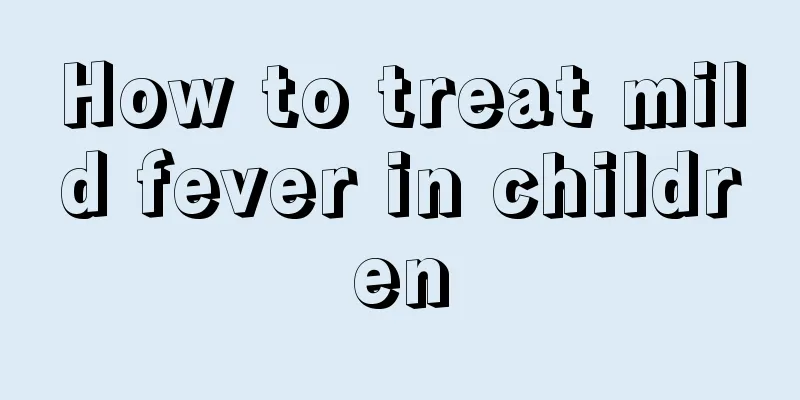Why does my child breathe heavily when sleeping?

|
When young mothers are taking care of their babies, their children's words and deeds are all issues that concern them. When babies are sleeping, they have symptoms of heavy breathing, which makes mothers very concerned. Generally, young mothers will be anxious and don't know what caused the child. In order not to make mothers sad and worried, let's understand why children breathe heavily when they sleep. Causes of snoring include: 1. It is easy to snore when sleeping on your back (facing up) because the root of the tongue falls backwards due to gravity when the face is facing upward, semi-blocking the breathing passage in the throat. 2. The respiratory passages of infants and young children, such as the nostrils, nasal cavity, and oropharynx, are relatively narrow, so they are easily blocked by the slightest secretion or swelling of the mucous membrane. Therefore, babies under six months old often have nasal sounds, nasal congestion or phlegm in the throat, which is caused by this reason. 3. When a cold causes swelling of the throat, inflammation of the tonsils, and increased secretions, it is more likely to cause airflow obstruction and worsen snoring. 4. People with abnormal face and head shapes, such as obese people or children with swollen tonsils, have thicker soft tissue in the oropharynx, which makes the airway in the oropharynx more easily blocked during sleep, so they snore very loudly. In more serious cases, there may even be difficulty breathing and respiratory arrest. Snoring is very common in infants and young children, which is related to the structural characteristics of their upper respiratory tract. The nose and nasopharynx of infants and young children are relatively short, their nasal passages are narrow, their nasal mucosa is tender and rich in blood vessels. Therefore, when infected, the nasal mucosa becomes congested and swollen, which can easily cause blockage. Their pharynx is relatively narrow and vertical, and rich in lymphoid tissue, including nasopharyngeal tonsils and palatine tonsils. The former is also called adenomatous tonsils, which develop before 6 months of age. If the proliferation is too large, it is called adenomatous tonsil hypertrophy. Since children suffer from a variety of acute infectious diseases, the nasopharynx becomes inflamed repeatedly, causing congestion and edema of the nasal mucosa and abnormal hypertrophy of the adenocarcinoma. The ventilation of the nasopharynx is obstructed, making it impossible to breathe through the nose during sleep and the children have to breathe through the mouth. As a result, the root of the tongue falls back and snoring is made with the breathing. Over time, snoring causes the pharyngeal mucosa to swell and thicken, resulting in a narrow pharyngeal cavity, which in turn causes respiratory arrest. At this time, not only is the snoring loud, but it is also accompanied by irregular breathing interruptions. This type of breathing interruption not only easily wakes the child up and affects his normal sleep, but also seriously threatens his heart and lung function. Since children need a lot of oxygen to develop, snoring can cause children to suffer from severe hypoxia during sleep, which directly leads to insufficient oxygen supply for brain development and causes a decrease in the secretion of growth hormone, which will not only affect the child's height, but also the child's future intelligence. What's going on when children breathe heavily while sleeping? Mothers should first check whether the child's nostrils are blocked, or whether they are not cleaned properly, the air is too dry, or illness may cause heavy breathing. If the baby is breathing heavily, crying, spitting up, and not sleeping, take the child to check whether it is a respiratory disease. |
<<: What are the symptoms of gastroesophageal reflux in children?
>>: What is the respiratory rate per minute of a newborn baby?
Recommend
Bruise on baby's buttocks and back
Every change in the baby after birth is watched b...
What should I do if my baby teeth haven't fallen out and new teeth have grown?
The baby teeth have not fallen out, but new teeth...
What factors affect the baby's height?
As the saying goes, "If the father is short,...
Lumbar pain in children
We know that lumbar pain mostly occurs in adults,...
7 nutrients to improve your baby's intelligence
A healthy diet can improve brain development. Whi...
What are the dangers of children using cosmetics?
Makeup has always been the privilege of adult wom...
Why is the child's face not smooth?
The roughness on a child's face is actually a...
Reasons for fever in baby's palms and soles
In the practice of many Chinese medicine doctors,...
Is it good to feed bird's nest to children?
Bird's nest is a tonic with very high nutriti...
What to do if your baby has a fever and high blood test results
Fever is a very common symptom in babies. It is m...
Why do newborns yawn and not sleep?
Sleep is something we all need. For people of dif...
Things to note when red spots appear on your baby's face
Babies are the apple of their mother’s eye. Mothe...
What to do if your baby has too much hair
Some babies have particularly heavy body hair, wh...
Early education of language and crawling skills for one year and eight months old babies
A one year and eight month old baby is almost abl...
Is it okay to take a bath when a child has a fever?
In daily life, I believe that many parents are mo...









